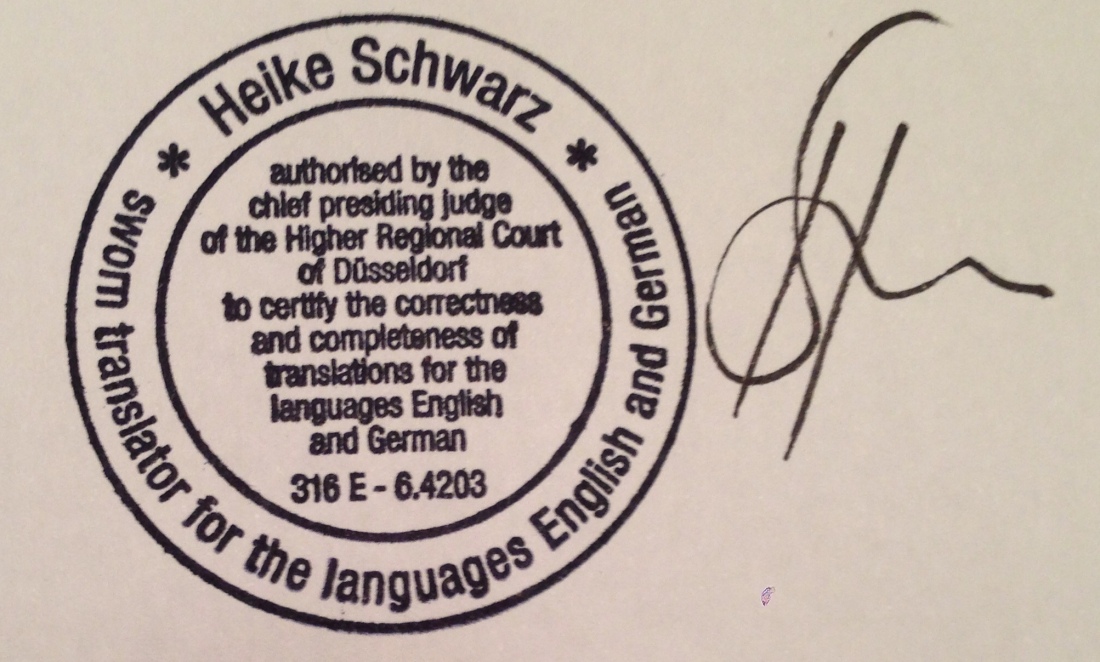I need a certified translation! Do I really need a certified translation? Why? What does it cost and where do I get it? I need it immediately! How soon can I get it done?
Questions over questions, and you might think it is a daunting and an expensive bureaucratic procedure. Well, relax, it’s not that complicated, nor expensive, and you can typically get your documents translated in a couple of days, if not same day delivery or next (which will obviously be more expensive) – and – you don’t need to hand over your precious originals, a digital copy is fine!
The following topics should cover your queries and if they don’t, just give Heike a shout, she runs a relocation and translation agency and is the author of this very helpful article. Bonus: As a so-called “Adult Third Culture Kid“, she has loads of empathy for your specific situation. Her birth cultures are German and South African and she also has vast Asian and Central and East European culture competency.
So, let’s get into the nitty-gritty details, shall we?
Translator or Interpreter? What’s the difference?
Whereas a translator translates written text, an interpreter translates orally. It’s as simple as that. So if you have documents you will consult a translator, on the other hand, if you need someone to accompany you for oral translation (highly recommended for onsite accommodation viewings and accompaniment to the aliens’ office (Ausländeramt) you will consult an interpreter. This article focuses mainly on translators. Sworn interpreters are generally only needed for court cases, but we hope you won’t need to go to court.
Why do I need a Certified Translation?
In order to verify the content of your documents that are needed as proof for several immigration purposes, German officials will need to understand them and therefore you will require a translation into German. To be able to do this properly they need to know that an accredited professional has done the translation. To this end, they rely on translations from professionals that have been authorized by the Higher Regional Courts (Oberlandesgerichte).
Professional translators have to prove sufficient legal knowledge; relevant experience, specific education and they have to undergo a stringent vetting procedure to acquire the accreditation, which has to be renewed on a regular basis. Luckily there is a very good market in Düsseldorf.
In order to find a translator for your specific language, all you have to do is consult the public court database and enter your language pair, location and whether you need an interpreter or a translator (see item 1 above for the difference).
What does it cost? What needs to be translated?
It’s really not unaffordable and you can deduct it from your income tax. Obviously issuing prices on a public post is a risk, and prices are permanently subject to change according to market fluctuations and individual reasons. Some agencies also offer discounts to students and/or to members of international clubs. Quite a number of translators have also endorsed TWB and even offer free services in cases of hardship (Translators Without Borders).
Interesting fact: If you feel that you are proficient enough to translate your own document and the quality is very good, you will only need an authorized translator to look over it and certify it, which might save you some money, since you only have to pay a proofreading and certification fee. However, beware, the translation has to be perfect, otherwise, you will run the risk of being overcharged for rework.
Here is a rough list of documents that you will need to get translated, depending on the purpose and duration of your stay:
| Type of document | Purpose | Ballpark range in (€ per document) |
| Drivers’ licence |
|
40 – 60 |
| Birth certificate |
|
60 – 80 |
| Marriage/divorce certificate |
|
60 – 100 |
| Reference letters, educational certificates, and your CV |
|
50 – 100 |
Okay, so where do I start?
- First, find out what needs to be translated, always ask this when you consult an official body
- Then find out if it needs to be certified or not
- If it needs to be certified, consult the public court database
- If not, just browse the web
- Then send out a few emails so that you can get a good price and find someone you can trust, crucial elements:
- Introduce yourself very briefly
- Provide a short brief (i.e. the purpose of your translation)
- Give a clear indication of your timeline (by when do you need the translation)
- Provide a digital copy of the document so that the translator can give you a price based on facts
- Add any additional information as you see fit
- Add your full address, phone number, and name
- Wait for replies and select your best service provider
- Clarify terms of payment and delivery and confirm job
- Wait for confirmation from service provider
We trust this information summarizes the topic of translation for you and we have been able to enlighten you. Translators are always also cultural transferrers so you can be sure that you will encounter good natured and emphatic species, who will more than often be ready to give you some bonus information.
If you have any additional questions, feel free to send Legal Translator, Heike Schwarz, an e-mail with your questions.
